Every Race Brings a New Experience – Sole Runners Pre-Marathon Tips

Every Race Brings a New Experience
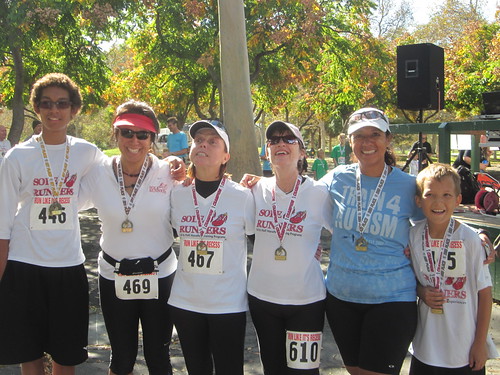
I remember training for my first marathon. I signed up thinking that 26.2 miles really wasn’t that far. I had done long backpack trips with a pack on. I was in decent shape and the worst-case scenario meant walking. No big deal, right?
I decided to do a half marathon before the big day, so a month and a half before the 2002 LA Marathon I did a half marathon in Orange County. I thought I was cool until the 10-mile mark, and then my legs were done. I walked the last 3 miles, hurting physically and mentally. I learned a valuable lesson that day. 13.1 miles was farther than I thought. And, I was in big trouble for my upcoming race.
The next Monday at work one of my colleagues, Shelly, asked me how it went. When I told him, he suggested Jeff Galloway’s book Marathon. I got it that day and immediately read it. I learned a great deal about getting ready for a marathon and that I was doing it all wrong. First of all I didn’t have any runs longer than 10 miles under my belt. My mind was not in the right place. And, I had not given enough respect to the task at hand. I knew I would not be properly prepared for my upcoming marathon, yet I started Galloway’s run/walk program.
My goal was sub 5 hours and I had bet friends $300 I could do it. Win or lose the money was going to charity so that was no big deal. I just had to finish, hopefully in less than 5 hours.
Race day came. The day was hot and the race started 45 minutes late. I started out slow only because there were so many people and with the race being delayed everyone needed a bathroom break in the first mile. Any bush or building worked for many of us. The next 13 miles were uneventful yet I was starting to feel it.
My friend Jason met me at mile 16 and had planned on running with me to mile 20 where some other friends, Michele and Shelly were going to help me finish the final six miles. Jason was great and ended up running with us all the way to the finish line. He carried my water belt that was heavy and bounced around on chafing my hips. I owe him and still thank him. I finished the last mile strong only because Shelly told me I would find something left in the tank. I did. I ran mile 26 in 8:07 for a 4:59:09.
I was beaten up and sore for a week. Going down stairs was torture. I had learned respect and how humbling long distance running could be.
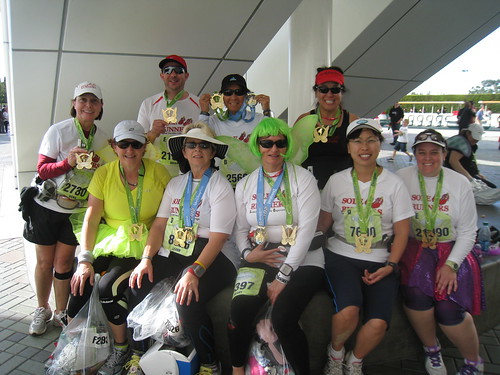
I tell this story because many, many marathons and other endurance races later, I am still humbled every time I am on the starting line. I respect the necessary training, the mental aspects, everyone racing, and the volunteers.
With the opportunity to participate in many races during our training season, I offer this story to remind all of us to show some humility out there, be thankful for all you have, listen to your body, thank everyone out on the course supporting you.
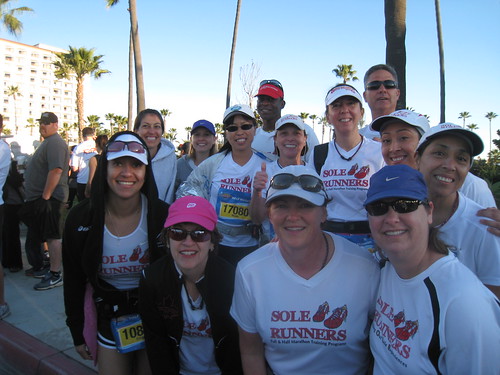
I get more questions on how much to eat before, during and after a marathon or race than any other question. You have been practicing eating on your long runs during your training. After extensive training, reading andpracticing, the following suggestions are based on my personal experience. I am not a nutritionist or a doctor. It is always a good idea to talk to a certified professional.
Pre-race days – I eat a balanced diet until Wednesday. Remember that most nutritionists recommend at least 50% of your daily calories come from carbs as part of a balanced diet. But race week I eat almost 70% carbs. I also eat proteins and fats. Of course, you should always try to make most of your carbs. I look for complex carbs like vegetables, legumes, grains and eat fruits. I also drink some of my water with electrolytes added in.
Wednesday and Thursday, I substantially up my caloric intake. I snack all day long.
Friday, I go back to regular eating.
Saturday, I eat light all day then I have a pre-race meal about 7:00 P.M. I am not a huge fan of “Carbo Loading” the night before the race because much of it can’t process into the body fast enough. In fact, I like some meat, my lucky pork chop, the night before to firm everything up inside me. That’s my routine and it works for me. Do you know what works for you?
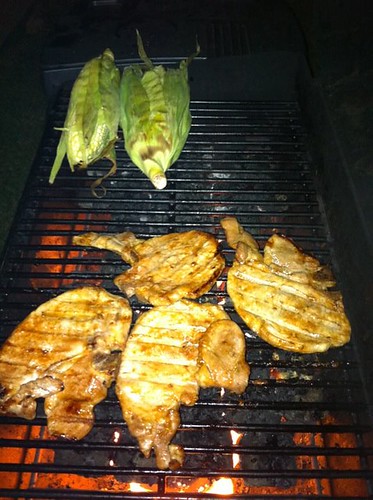
Race-day – I wake up early to eat my race-day meal of oatmeal mixed with super greens, banana, and a cup of coffee and maybe even some tea. I eat this about 2.5 hours before the start of the race.
I usually bring a Cliff Bar, coconut water, water to eat and drink before the race and some honey to eat right at the start. I sip the drinks and eat a little while I wait for the start. I stay away from sports drinks in the hour right before the race to keep my blood sugar level in check.
I’ll eat between 150 – 250 calories every hour. This will be different for each one of you depending on your height, weight and gender. Most of you should try to get down at least 100 calories each hour on the course. I usually eat solid food early in the race before going to the gels in the last two hours.
DO NOT CHANGE ANYTHING NOW (it is too late or you are taking chances), eat what you have been practicing eating during your training runs.
Post-race – Try to get some food in you right away. I look for some protein mixed in with some carbs. I drink chocolate milk (that I bring with me), maybe some sports drinks, and I walk around. I’ll wait an hour or two before I eat a larger meal.
Look back at the notes from this season on what you ate to see what worked for you or what didn’t. Learn a pre-race food routine. If you can do this with your fuel you will learn to take the guesswork out of your race so you can relax and avoid the bonk (running out of gas).
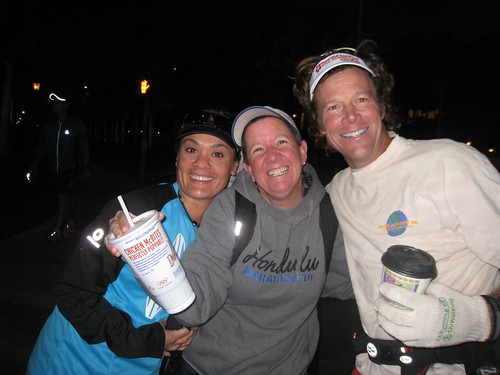
Train Focused, Steve Mackel – Head Coach Sole Runners Full and Half Marathon Training Programs





